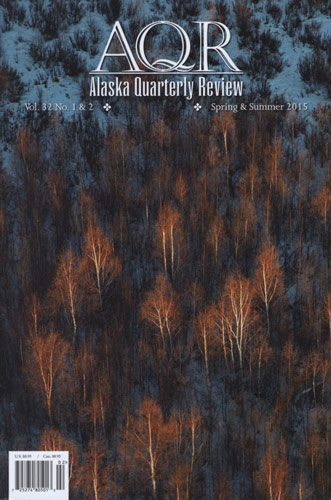Alaska Quarterly Review – Spring/Summer 2015
At 300 pages, this double issue of Alaska Quarterly Review packs a quantity of poetry and prose, including 44 poems, 10 stories, and 3 pieces labeled nonfiction. At 300 pages, this double issue of Alaska Quarterly Review packs a quantity of poetry and prose, including 44 poems, 10 stories, and 3 pieces labeled nonfiction.
At the front of this issue is an extended special feature titled “Gaza: The Land Behind the Fence, A Photographic Essay,” by Eman Mohammed. Almost forty pages long, the piece has black-and-white and color photographs of airstrikes, ruins, daily scenes, and people both alive and dead. There is a brief introduction by Mohammed and an editorial note that begins:
Eman Mohammed is a Palestinian refugee who was born in Saudi Arabia and educated in Gaza City, where she started her career in 2006. As the first female photojournalist in Gaza at the age of 19, she faced discrimination and sexual harassment.
While three editors “contributed to the preparation of this feature,” it is difficult to know what to make of it. Does it celebrate a brave young woman who documents life in a dangerous place? Or does it score a point for the Palestinians? Some of the photos are beautiful, but nowhere does the text mention history and politics, the reasons for the suffering, which would have been good to include for those who are unfamiliar with the conflict.
Fiction takes up the largest amount of space in this issue of AQR. There are long, traditional stories, like “Breeders’ Cup” by Greg Schutz, about an old veterinarian in rural Appalachia. It has brief passages of dialogue, characters who are cows or dogs, and quite a bit of these kind of descriptions: “he wouldn’t have guessed her a mother. Her skittish, erratic energy recalls the spinster women he sometimes meets through his work,” a good addition to his writing.
There are short, experimental stories, like Bonnie Nadzam’s “The Boulevard,” which begins: “I dreamt it was the end of the world and you were finally mine.” “Guided Meditation” by Emily Mitchell is a clever take on the person who wants to “access his or her deeper states of consciousness” in a group: “If you don’t feel the tension draining out of you, you really need to try a bit harder to relax.” In “Personal Space” by Miriam Fried, a heartsick lout sits between a couple on a city bus and phones his girlfriend. The woman tells the story, and she wants her husband to notice. “A few years later when my marriage was over [ . . . ] I thought again of the boy on the bus.”
All three nonfiction pieces read like fiction, with looney characters, over-the-top situations, and a wealth of sensuous detail that sounds made-up. “Be Destroyed” by James Allen Hall tells about his parents’ failed marriage, their failed delivery business, and their Florida home crawling with 131 cats. “Dogsucker: The Written Oral” by Lawrence Lenhart combines a painful boyhood story about his Yorkshire terrier with the Greek myth of Pasiphaë—twenty pages on bestiality. Fortunately, “Gastrolog” by Erica Mosley is a hilarious send-up of food journalism as memoir, ending with a kitchen fire and an antique juicer.
The poems range from the creepy “Cadaver 28” by Laura Kolbe, who dissects a 60-year old male cadaver; to the sad “Fractions” by John Bargowski, about a poor, abused boy in Catholic school; to three poems by Holly Karapetkova, all with the same title and all surreal riffs on the color white. “Marie Curie’s Passion” by Kate Gleason is curiously moving, a meditation on the French scientist who discovered radium. Her love for her work fused with her love for her husband. George Bilgere paints a straightforward picture of street life in “Farmers’ Market,” then shows us an Iraq war veteran:
on his tiny electric wheelchair, barely more
than a rolling pedestal since there’s not much
to move, just a head and torso . . .
All of the contributors in AQR have publication credits, including books of poetry and stories in anthologies, so there are no rookies here. If some of the subjects are unappealing, the writing is always first-rate. As readers, maybe that is all we can ask for.
[www.uaa.alaska.edu/aqr]





